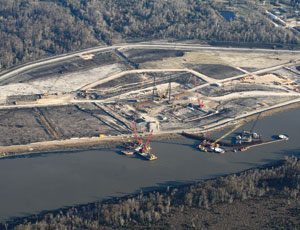More than 400 contractors hungry for work packed into two standing-room-only sessions at a Jan. 13 industry day, hosted by the U.S. Army Corps of Engineers New Orleans District (NOD), in hopes of learning what it would take to get a piece of a $14.3-billion program to built levees, pump stations and other flood-resistant infrastructure.

Under the Greater New Orleans Hurricane and Storm Damage Risk Reduction System program, NOD is offering fully funded federal contracts to bring the region to 100-year levels of protection by June 1, 2011. NOD and Hurricane Protection Office will award the remaining estimated 123 contracts, valued at $2.02 billion, in fiscal year 2010, says Col. Alvin Lee, NOD commander. In 2004, the program size for the entire NOD was $525 million. Roughly 35 construction contracts valued at $125 million were awarded, Lee says.
In 2010, contracts will range from less than $1 million to up to $750 million. A $150-million to $200-million contract to elevate a stretch of levees in eastern New Orleans will be let later this month. A $400-million to $750-million design-build contract will be let in February to build permanent pump stations at the city’s three outfall canals.
Yet many Louisiana and small contractors “feel they are being locked out of business,” says Sen. David Heitmeier (D), who asked the Corps to engage small businesses and Louisiana contractors by hosting the industry day. The purpose was to provide information about government contracts, including scope of work and contracting methods, to these contractors and small businesses. It included specific instructions on how to work with the federal government, including explaining Federal Acquisition Regulations for performance bonds and how to sign up for the Central Contractor Registry.
“In the current economy, the federal government is the only one with dollars to spend on construction,” says Freddie Rush, executive vice president of Mississippi Valley Associated General Contractors. Due to the recession, “interest by contractors who have never done federal work before is extremely high,” he says. But such contractors have no way of knowing what is coming down the pipe and how to prepare for it, “unless you monitor FedBizOpps.com or the Corps site on a daily basis,” he adds.
But by the time a project is posted on FedBizOpps, “it’s late in the game,” says Matthew Alix Jr., business development for KOO Construction Inc., Sacramento. “You need to know those projects six months in advance so you can start positioning financially and team-wise.”
Large contractors currently performing work for the Corps gave detailed descriptions of their criteria for choosing subcontractors. The Small Business Administration and the Corps’ Procurement Technical Assistance Center made presentations about specific requirements for federal work.
Mike Carter, U.S. regional manager for Giken America Corp., Orlando, Fla., says he thought the small-business participation offered more “lip-service fluff” than anything substantive. “I didn’t get the feeling the contractors wanted a lot of small-business participation unless they could get someone to take on some of their liability,” he says. Still, he felt the networking opportunity was valuable.
Alix contends that the Corps and its big contractors should have included more set-aside contracts. “We went to New Orleans looking for work as a small business—and also for our protégé firm, Total Team Construction Services, a [service-disabled, veteran-owned] firm based in Sacramento,” Alix says. “We feel pretty good that we can compete on some of the set-aside work, but we are not comfortable with the large number of contracts that were listed as unrestricted, best value.”
The Corps plans more pre-solicitation conferences and instructional forums because it is resulting in “highly qualified bidders bidding on our projects,” Col. Lee says. The next informational session at the New Orleans District is on Feb. 2.


Post a comment to this article
Report Abusive Comment